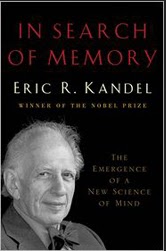 In “The Last Boy: Mickey Mantle and The End of America’s Childhood,” Jane Leavy’s excellent book about the iconic Yankee slugger, she points out that many people then, and since, have wondered, “What made Mantle, Mantle?”
In “The Last Boy: Mickey Mantle and The End of America’s Childhood,” Jane Leavy’s excellent book about the iconic Yankee slugger, she points out that many people then, and since, have wondered, “What made Mantle, Mantle?”
In an effort to explain his seeming preternatural ability to summon, with such consistency, the perfect blend of bat speed, eye contact and power to hit a baseball farther than most thought possible, Leavy interviewed Eric R. Kandel, who won the 2000 Nobel Prize in Physiology/Medicine, and who is now director of the Kavli Institute for Brain Science at Columbia University.
 In his book, “In Search of Memory: The Emergence of a New Science of Mind,” Kandel addresses muscle memory for the baseball question, but also talks about another aspect of the mind that bears on lawyers’ ability to learn the skills needed to generate business.
In his book, “In Search of Memory: The Emergence of a New Science of Mind,” Kandel addresses muscle memory for the baseball question, but also talks about another aspect of the mind that bears on lawyers’ ability to learn the skills needed to generate business.
“There are two kinds of memories — implicit and explicit. Explicit memory is for people, places and objects. Implicit memory storage is hitting a tennis ball or baseball, doing anything that involves sensory motor skills.”
Explicit can become implicit
With sufficient reiteration, an explicit memory can become implicit, literally moving from one storage center in the brain to another. Once a task is mastered, it can become automatic, almost reflexive.
“When you first learn how to drive a manual transmission car, you’re just paying attention all the time,” Kandel said. “You’re terrified. You’re saying, ‘Now I shift, now I don’t.’ After you learn, you don’t tell yourself when to shift. You do it automatically.”
Implicit memory is recalled through performance, “without conscious effort or even the awareness that we are drawing on memory.”
One of the reasons that successful rainmakers struggle to teach others in their firms is due to what is known as “expertise-induced amnesia,” which is a form of degradation of procedural memory. In short, to make an implicit memory explicit again causes the expert to “start thinking about what they’re doing and mess everything up.”
...the opportunity cost of practicing on real prospects is prohibitive.
Rainmakers don’t consciously know what they’re doing, so they can’t explain it to others, any more than Mickey Mantle was able to explain how he hit the ball so hard.
For law firms, there are two takeaways from this:
-
Stop trying to have successful partners conduct sales training in your firm. If they’re actually any good, they probably can’t explain what they do. More frequently, they acquired their impressive books of business in a Seller’s Market that no longer exists, and which behaviors are now counter-productive in today’s Buyer’s Market. You’ll give those they train bad habits that will be costly to eradicate.
-
The key to implicit memory is “sufficient reiteration.” “How do you get to Carnegie Hall? Practice, practice, practice.” Few lawyers have enough real-world opportunities and time-in-market to satisfy this requirement, and the opportunity cost of practicing on real prospects is prohibitive.
*
[Mike O’Horo, known by thousands of lawyers as The Coach, is a serial innovator in the law firm business development world. His latest innovation is Dezurve, which has cracked the code on identifying investment-worthy lawyers and eliminating training budget waste.]